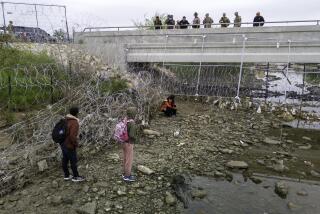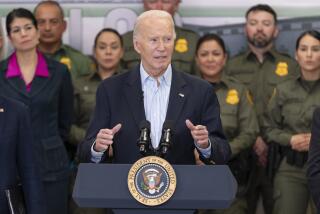It’s the U.S.-Mexico border, not the Wild West
Now we have an idea why the U.S. Customs and Border Protection service was keeping secret an independent report of its encounters at the Mexican border. Because it has something to hide.
As The Times’ Brian Bennett reported last week, an independent report by the nonprofit Police Executive Research Forum sharply criticized the agency for a “lack of diligence” in investigating fatal encounters involving its agents. The report, based on internal case files of 67 shooting incidents leading to 19 deaths between January 2010 and October 2012, also faulted some of the agents’ practices, including positioning themselves in the “exit path” of fleeing vehicles apparently as a pretext for opening fire in self-defense. Not only is that contrary to commonly accepted policing practices, but it endangers passengers in the car as well as the agents, since a dead driver can’t control a moving vehicle.
The report also reinforced earlier findings by the Department of Homeland Security’s Inspector General on the even more bizarre practice of agents firing across the border when people on the other side throw rocks at them. Yes, a thrown rock can cause significant damage, including death if it strikes an unprotected head. But to respond to rock throwing with live ammunition across an international border — on 22 occasions in 2012 — strikes us as excessive. Was there really no other way to address the problem?
U.S. Customs and Border Protection, a division of the Homeland Security Department, is the biggest police agency in the nation. It has doubled in size since 9/11 and now employs more than 43,000 Border Patrol agents and customs officers.
Certainly there are dangers involved in patrolling the border, and agents must be able to protect themselves. But the agency must also train its employees to operate professionally and not to respond to aggression with excessive force.
Why did it take a leaked report to a journalist to bring some of these details to light? Last fall, Congress had sought the independent report (commissioned by the agency itself) but received only a redacted summary. The report also notes that the agency has not made public its rules of lethal engagement for border agents, another practice out of step with most law enforcement agencies.
Such secrecy leads reasonable minds to wonder what other behaviors the department might be hiding. If the Obama administration does not force more openness from the department, Congress should.
More to Read
A cure for the common opinion
Get thought-provoking perspectives with our weekly newsletter.
You may occasionally receive promotional content from the Los Angeles Times.






